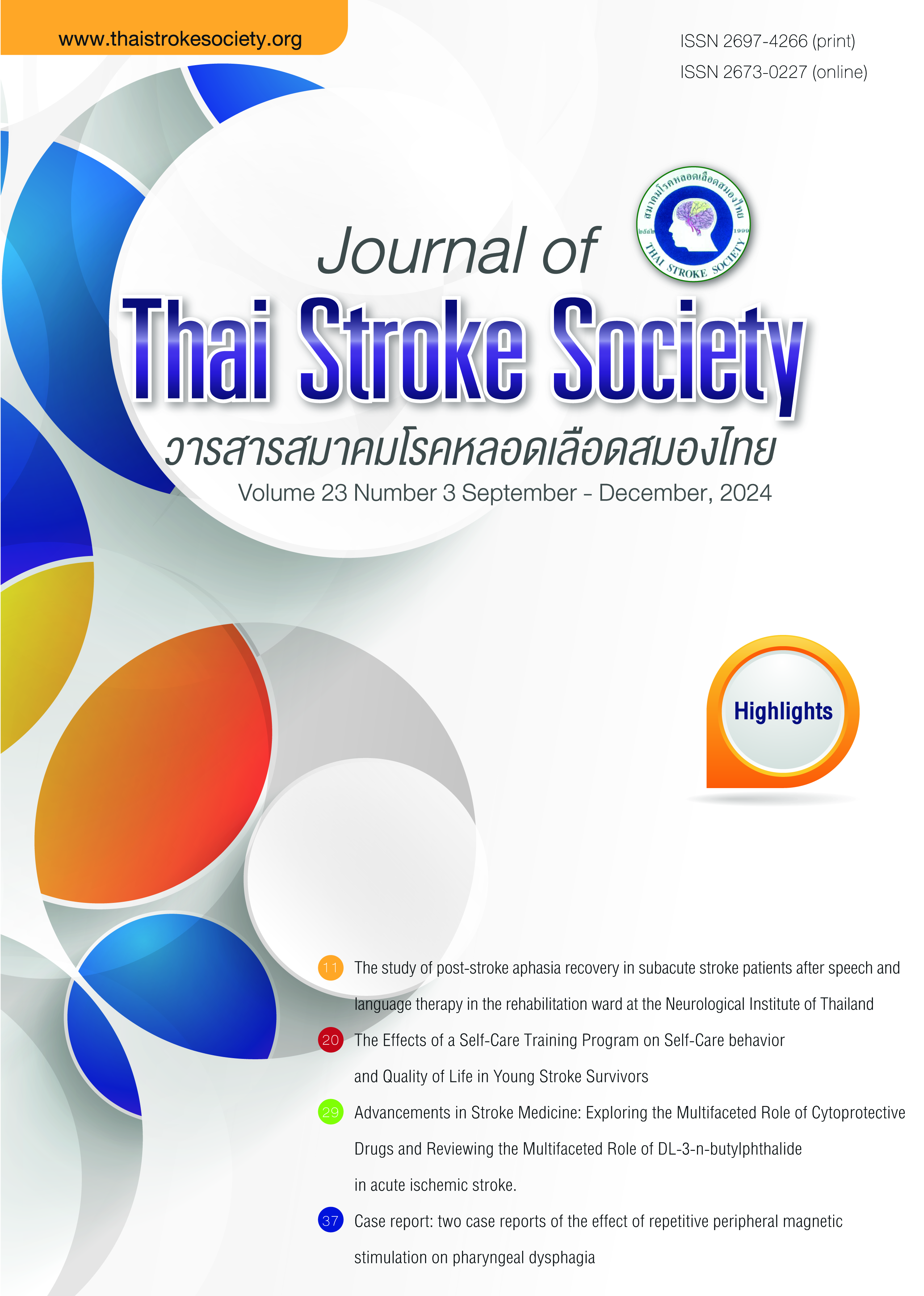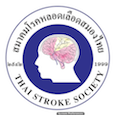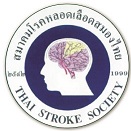The study of post-stroke aphasia recovery in subacute stroke patients after speech and language therapy in the rehabilitation ward at the Neurological Institute of Thailand
Keywords:
Post-stroke aphasia, Rehabilitation, Stroke, Speech and language therapyAbstract
Objective: To study the outcome of language recovery after speech and language therapy by the speech therapist in subacute post-stroke aphasic patients.
Method: This was an observational prospective study in subacute stroke patients with aphasia being hospitalized for stroke rehabilitation with the intermediate care program. Demographic and stroke data was recorded. Speech and language therapy was applied to the patients, 30 minutes per day, five days of a week, for four successive weeks. Aphasia assessment was performed with the Thai Adaptation of Western Aphasia Battery test (Thai WAB) before and after speech and language therapy. Type of aphasia was determined.
Result: 19 patients were recruited, of which 12 (63.2%) were male with a median age of 62 (IQR 53-67) year-old. Ischemic stroke was 11 (57.9%) and hemorrhagic stroke 8 (42.1%). After rehabilitation, a statistically significant increase was detected in all subtests (spontaneous speech, auditory comprehension, repetition, naming) and AQ score (P≤0.001). Severity of aphasia tended to be less severe. The types of aphasia also changed to the milder form.
Conclusion: Rehabilitation in subacute post-stroke aphasic patients according to intermediate care program could cause the increased outcome.
References
Zumbansen A,Thiel A. Recent advances in the treatment of post-stroke aphasia. Neural Regen Res. 2014;9:703-6.
Watila MM, Balarabe SA. Factors predicting post-stroke aphasia recovery. J Neurol Sci. 2015;352:12-8.
Cichon N, Wlodarczyk L, Saluk-Bijak J,Bijak M, Redlicka J, Gorniak L, et al. Novel advances to post-stroke aphasia pharmacology and rehabilitation. J Clin Med. 2021;10:3778.
ปิยะภัทร เดชพระธรรม. การฟื้นฟูผู้ป่วยโรคหลอดเลือดสมอง. ใน:กุลภา ศรีสวัสดิ์, บรรณาธิการ. เวชศาสตร์ฟื้นฟูในปัญหาที่พบบ่อย. กรุงเทพฯ:พี.เอ.ลีฟวิ่ง;2561.น.217-55.
Yang SN. Current evidence for post stroke aphasia treatment. Brain Neurorehabil. 2017;10(2):e15.
Laska AC, Hellblom A, Murray V, Kahan T, Arbin MV. Aphasia in acute stroke and relation to outcome. J Intern Med. 2001;249:413-22.
Yamaji C, Maeshima S. Spontaneous recovery and intervention in aphasia. In: Jianu DC, Muresanu D, editor. Aphasia compendium [Internet]. London: IntechOpen; 2021 [cited2021Oct23]. p. 429-707. Available from: https://www.intechopen.com/chapters/79101
Fridriksson J, Hillis AE. Current approaches to the treatment of post-stroke aphasia. J Stroke. 2021;23:183-201.
Lazar RM, Speizer AE, Festa JR, Krakauer JW, Marshall RS. Variability in language recovery after first-time stroke. J Neurol Neurosurg Psychiatry. 2008;79:530-4.
Sul B, Kim JS, Hong BY, Lee KB, Hwang WS, Kim YK, et al. The prognosis and recovery of aphasia related to stroke lesion. Ann Rehabil Med. 2016;40:786-93.
Koyuncu E, Cam P, Altinok N, Calli DE, Duman TY, Ozgirgin N. Speech and language therapy for aphasia following subacute stroke. Neural Regen Res. 2016;11:1591-4.
Ruamsuk S, Nga-amsri A. Scores of language and speech performance in Thai young adult aged 15-24 years old by using Thai adaptation of WAB test. J DMS.2015;40:66-79.
Dardarananda R, Potisuk S, Gandour J, Holasuit S. Thai adaptation of the Western Aphasia Battery (WAB). Chiang Mai Med J. 1995;34:157-9.
Pedersen PM, Vinter K, Olsen TS. Aphasia after stroke: type, severity and prognosis: the Copenhagen aphasia study. Cerebrovasc Dis. 2004;17:35-43.
Yan Z, Wei D, Xu S, Zhang J, Yang C, He X, et al. Determining levels of linguistic deficit by applying cluster analysis to the aphasia quotient of Western Aphasia Battery in post-stroke aphasia. Sci Rep. 2022;12:15108.
Lee JK, Ko MH, Park SH, Kim GW. Prediction of aphasia severity in patients with stroke using diffusion tensor imaging. Brain Sci. 2021;11:304.
The REhabilitation and recovery of peopLE with Aphasia after StrokE (RELEASE) Collaborators. Predictors of poststroke aphasia recovery: a systematic review-informed individual participant data meta-analysis. Stroke. 2021;52:1778-87.
Stefaniak JD, Geranmayeh F, Ralph MA. The multidimensional nature of aphasia recovery post-stroke. Brain.2022;145:1354-67.
Hoffmann M, Chen R. The spectrum of aphasia subtypes and etiology in subacute stroke. J Stroke Cerebrovasc Dis. 2013;22:1385-92.
Ali M, Basat AL, Berthier M, Johansson MB, Breitenstein C, Cadilhac DA, et al. Protocol for the development of the international population registry for aphasia after stroke (I-PRAISE). Aphasiology. 2022;36:534-54.
Martins IP, Leal G, Fonseca I,FarrajotaL, Aguiar M, Fonseca J, et al. A randomized, rater-blinded, parallel trial of intensive speech therapy in subacute post-stroke aphasia: the SP-I-R-IT study. Int J Lang Commun Disord. 2013;48:421-31.
Roberts S, Bruce RM, Lim L, Woodgate H, Ledingham K, Anderson S, et al. Better long-term speech outcomes in stroke survivors who received early clinical speech and language therapy: what’s driving recovery?. Neuropsychol Rehabil. 2021;32:2319-41.
Khedr EM, Abbass M, Soliman R, Zaki AF, Gamea A, El-Fetoh NA, et al. A hospital-based study of post-stroke aphasia: frequency, risk factors and topographic representation. Egypt J Neurol Psychiatry Neurosurg. 2020;56:2.
Downloads
Published
How to Cite
Issue
Section
License
Copyright (c) 2024 Journal of Thai Stroke Society

This work is licensed under a Creative Commons Attribution-NonCommercial-NoDerivatives 4.0 International License.
ข้อความภายในบทความที่ตีพิมพ์ในวารสารสมาคมโรคหลอดเลือดสมองไทยเล่มนี้ ตลอดจนความรับผิดชอบด้านเนื้อหาและการตรวจร่างบทความเป็นของผู้นิพนธ์ ไม่เกี่ยวข้องกับกองบรรณาธิการแต่อย่างใด การนำเนื้อหา ข้อความหรือข้อคิดเห็นของบทความไปเผยแพร่ ต้องได้รับอนุญาตจากกองบรรณาธิการอย่างเป็นลายลักษณ์อักษร ผลงานที่ได้รับการตีพิมพ์ในวารสารเล่มนี้ถือเป็นลิขสิทธิ์ของวารสาร





